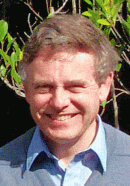Johann Wempe Award 2002 - Russel Cannon

Russel Cannon
Dr Russell Cannon (born 1942), Director of the Anglo-Australian Observatory (AAO) Sydney/Coonabarabran between 1986 and 1996, is honoured this year with the Johann Wempe Award for his outstanding achievements in the field of spectrographic sky detection. Dr. Cannon played a major role in the development of the "2-degree instrument" (2dF), a complex fibre optic technique that allows the light spectra of 400 points to be collected and analysed simultaneously. Before moving to Australia, Dr Cannon was Deputy Director of the Royal Observatory, Edinburgh, where he was responsible for the photographic survey of the southern sky with the 1-m Schmidt telescope, also in Australia.
The prize is awarded in honour of the last director of the Astrophysical Observatory Potsdam, Prof. Dr. Johann Wempe (1906-1980), himself a spectroscopist. The laureate will give a prize lecture on "The Development of Astronomical Spectroscopy" at the AIP on 20 September. Wempe had bequeathed his fortune to the Central Institute for Astrophysics in his will to improve the living conditions of the Institute's staff. The Johann Wempe Prize draws on the remaining part of that legacy. In addition to his prize lecture, Russell Cannon will spend some time at the AIP to hold scientific discussions with various Institute members and thus enrich the scientific life at the Institute. His main scientific interest is in galactic globular clusters, particularly the abundance of elements in them. This is a strong constraint on the formation models. In this context, there is a good link to the "Star Formation" working group headed by Dr. Hans Zinnecker, with whom he will cooperate.
The fibre optic technology of the "2dF" instrument allows the simultaneous recording of 400 points within an angle of 2 degrees. This made it possible to measure the redshift of a quarter of a million galaxies, ten times more than previous surveys. The AIP has a similar instrument in the form of the Potsdam Multi-Aperture Spectrometer (PMAS), which is currently being set up in Spain under the direction of Dr Martin Roth, and thus has another interesting point of contact with the Australian guest scientist.